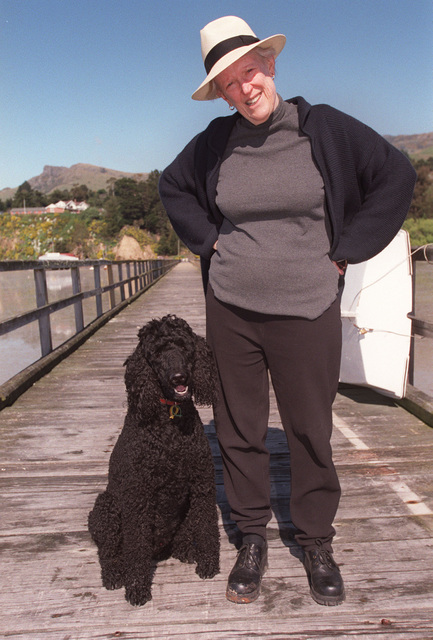Title of the work
Country of the First Edition
Country/countries of popularity
Original Language
First Edition Date
First Edition Details
Margaret Mahy, The Catalogue of the Universe. London: J. M. Dent & Sons, 1985, 185 pp.
ISBN
Awards
2005 – Phoenix Award, Children’s Literature Association of America
Genre
Bildungsromans (Coming-of-age fiction)
Novels
Target Audience
Young adults
Cover

We are still trying to obtain permission for posting the original cover.
Author of the Entry:
Elizabeth Hale, University of New England, ehale@une.edu.au
Peer-reviewer of the Entry:
Miriam Riverlea, University of New England, mriverlea@gmail.com
Daniel A. Nkemleke, University of Yaounde 1, nkemlekedan@yahoo.com

Portrait of Margaret Mahy with her dog, courtesy of David Alexander.
Margaret Mahy
, 1936 - 2012
(Author)
Margaret Mahy was born in 1936, in Whakatane, in the North Island New Zealand, the daughter of an engineer (a bridge-builder) and a teacher. From her early years, she was a precocious reader and writer. She studied for a BA at the then University of New Zealand, before training as a librarian in Wellington. Her first stories were published in the New Zealand School Journal, and were published internationally from 1969, following their discovery by an American editor. Before she was able to support her full time writing, Mahy drove a book bus in Canterbury, in the South Island, and worked as a librarian at the Christchurch Public Library. She wrote over 100 works, including novels, story collections, picture books, songs, essays and plays, and received many literary awards, both nationally and internationally. She was awarded the New Zealand Prime Minister’s Award for Literary Achievement (2005), and the Hans Christian Andersen Award (2006) and the Sir Julius Vogel Award for Services to New Zealand Science Fiction and Fantasy (2006). She died in 2012. In 2015, the Margaret Mahy Family Playground was opened in central Christchurch.
Sources:
Dossier, Nomination to IBBY Hans Christian Andersen Awards DATE. Country of Nomination: New Zealand; Writer Candidate: Margaret Mahy.
Duder, Tessa, Margaret Mahy: A Writer’s Life, Auckland: Harper Collins, 2012.
Profile at the bookcouncil.org.nz (accessed: June 27, 2018).
Bio prepared by Elizabeth Hale, University of New England, ehale@une.edu.au
Translation
Afrikaans: As die Wereld Wankel, trans. Dorothea Krige, Kaapstad: Human and Rousseau, 1991.
Danish: Hjertets Labyrint, trans. Ilse M. Haugaard, Copenhagen: Gyldendal, 1998.
Dutch: De Wereld I Linkshandig, trans. Piet Verhagen, Amsterdam: Querido, 1987.
Finnish: Tähtien Tytar, trans. Helene Bützow, Helsink: Tammi, 1991.
German: Das Gesammelte Universum, trans. Cornelia Kutz-Arnold, Ravensburg: Maier, 1993.
Japanese: 贈りものは宇宙のカタログ [Okurimoro wa uch ū], trans. Yukiko Aoki, Tokyo: Iwanami Shoten, 1992.
Spanish: El Catálogo del Universo, trans. Mercedes Garcia Reina, Barcelona: Ediciones B, 1989.
Swedish: Tycho & Angela, trans. Ebba Hamelburg, Stockholm: En bok för alla, 1999.
Summary
In The Catalogue of the Universe, eighteen-year-old Christchurch teenagers Angela May and Tycho Potter have finished high school and are considering their futures. Angela lives in an isolated cottage on the hills near the city, with her single mother, Dido. Believing the stories Dido had told her about a doomed romance, Angela tracks down her absent father, Roland Chase, and confronts him, hoping to reunite them. She finds him to be a self-absorbed businessman, for whom his youthful affair with Dido was nothing serious. Tycho is the quiet youngest of a suburban family, obsessed with Ancient Greek philosophy, and a text called the “Catalogue of the Universe”. He is in love with Angela, who is beautiful and wild. As Angela’s actions cause pain to herself, and a rift with her mother, steady Tycho reflects on the nature of the universe, thinking about the balance (the "wobble in the symmetry,") and using his interest in philosophy and the astronomy as a framework for thinking about human emotions. Angela and Dido are reconciled when each believes the other has perished in a fiery car crash on the perilous road that snakes towards Dido’s house. Tycho and Angela become lovers—short Tycho standing on the "Catalogue" to kiss her. The novel’s opposites hold one another in balance, showing that though there is a "wobble" in the fabric of the universe, there is also "symmetry".
Analysis
In The Catalogue of the Universe Mahy uses seemingly opposed forms of ancient literature to explore the puzzles of adolescent existence. On the one hand, Angela’s mother, Dido is "partly mythological," almost an oracle, who scythes the lawn in the moonlight, and who invents a story of doomed teenage romance to soothe her fear that her child will feel unloved. On the other, Tycho Potter is an everyday boy who is inspired by things that "some old Greek said ten thousand years ago," finding in philosophy and astronomy a set of rules and guides for understanding the universe. Set against a contemporary New Zealand setting, Mahy shows how ancient myth and thought are still relevant in the adolescent’s coming of age, both in terms of the remnants of old magic, and in terms of the relevance of philosophical truths.
Further Reading
Hale, Elizabeth, Sarah Fiona Winters, Marvellous Codes: The Fiction of Margaret Mahy, Wellington: Victoria University Press, 2005.
Hester, Sam, "The Wobble in the Symmetry: The Narrator’s Role in The Catalogue of the Universe", in Hale & Winters, eds., Marvellous Codes: The Fiction of Margaret Mahy, Wellington: Victoria University Press, 2005, 168–186.
Jackson, Anna, Geoffrey Miles, Harry Ricketts, Tatjana Schaefer, Kathryn Walls, A Made-Up Place: New Zealand in Young Adult Fiction, Wellington: Victoria University Press, 2011.
Pohl, Michael, Classical Myth and Margaret Mahy's Young Adult Fiction: A Thesis Submitted to the Victoria University of Wellington in Fulfilment of the Requirements for the Degree of Master of Arts in English Literature, Wellington: Victoria University Press, 2010.
Addenda
Mahy is a New Zeland writer,though many of her books were first published overseas.


